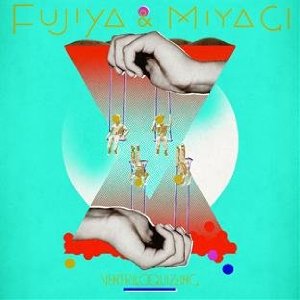Based around the concept of subterfuge and deception, all is not as it seems on this, the fourth album from Brighton’s kosmische explorers Fujiya & Miyagi. For an album recorded in the Sunshine State of California under the auspices of Devandra Banhart producer Thom Monahan, Ventriloquizzing is fuelled by a darkness whose shadows grow ever longer as this collection progresses to its bleak conclusion – and one where the surface sheen does much to mask the murk.
More importantly, Ventriloquizzing works hard to restore the band’s balance after the wobble of its predecessor, Lightbulbs. Perhaps feeling self-conscious of parading their influences a little too proudly – the precise motorik rhythms of Neu! and the groove of Can have always loomed large in Fujiya & Miyagi’s oeuvre – Lightbulbs (with the exception of the truly magnificent ‘Knickerbocker’) was an album that was left wanting thanks in part to Fujiya & Miyagi’s deliberate attempt to move away from what made them such a tantalising prospect in the first place.
Crucially, Ventriloquizzing finds the band building on their influences to create a vernacular of their own. With nary a motorik beat within earshot, Fujiya & Miyagi gleefully explore alternative rhythms with ever growing layers of analogue synths and keyboards. These are underpinned with throbbing and compulsive basslines all tied up with an ever-present mood of menace. Singer-guitarist David Best frequently resembles that paranoid voices that haunt the brain with self-doubt at 3am after one too many hits from the bong and ‘Sixteen Shades Of Black And Blue’ is genuinely unsettling as he intones, "I’ll beat you black/I’ll beat you blue".
And yet for album whose lyrical pre-occupations take in addiction (‘Pills’), stupidity (‘Cat Got Your Tongue’) and loneliness (‘Universe’), the music frequently plots a journey into joyous territories where the stated objective is that of moving feet rather than pondering the brain. The funk of ‘Taiwanese Roots’ and ‘Pills’ prove irresistible as they evoke memories of 70s caper movies and re-interpreting Scott Walker’s late 60s output in a digital idiom and, like LCD Soundsystem, Fujiya & Miyagi possess the uncanny ability of raiding your record collection, mixing it up so you don’t have to and creating a result that’s at once immediate and something to be cerebrally savoured.
This is Fujiya & Miyagi’s high water point to date and one that should at last grant them the wider recognition that they truly deserve.


